David Julyan didn't grab our attention with loud, symphonic mayhem on the contrary: his restrained ambient scores enhanced with synthesizers is what got to us. We first heard his strange musical world in Memento in his melancholic, yet energetic compositions. He developed his style in Insomnia, while The Descent showed his other side. David Julyan is a frequent collaborator of director Christopher Nolan we interviewed the composer about his body of work and their latest movie, The Prestige.
What made you think about becoming a film composer? What kind of troubles did you have as a beginner composer?
I don't think I ever decided to be a film composer as such. When I was at college, I was writing weird ambient music and was wondering how I would ever get someone to pay me to write this music. Then I a friend asked if I would do some music for one of his short films and it all sort of started from there.
How would you define your distinctive style?
I like other people to define my style. That's what the critics are for. I feel my scores all sound different but clearly have some common factor running through them, ambient, atmospheric, dark?
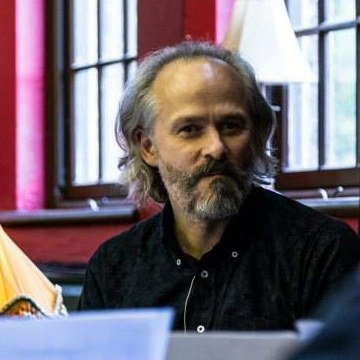 What were the first softwares you used for composition? How frequently do you use them now that you have a option to work with an orchestra?
What were the first softwares you used for composition? How frequently do you use them now that you have a option to work with an orchestra?When I started composing, I was just using a very simple computer called an Atari ST. Since then studio has grown, I now write in Digital Performer. The technology that I used then and now is different but I think the process is still similar. Some of the synths I used on Following were still used on Prestige. Nothing ever gets thrown away. The more I have to hand, the better.
Your first score to Christopher Nolan's short was Larceny. Since this picture is really hard to trace down, could you tell us something about the movie and the score?
I won't call Larceny the prequel to Following, but it was almost the test run. When Christopher Nolan got a team of friends together and approached making Following, even though we had no money, he approached it very seriously. Before he made that, he made Larceny which was a 10 minute short. To see if we could actually do it before we jumped to the major film. We made a short film with the same team of people to see how it worked. The film actually features the same actor, Jeremy Theobald, as in Following. In this case, he's the burglar. It's a short film about a break-in to someone's apartment.
How did you get in touch with Christopher Nolan and how did you end up being a Nolan-regular?
We were both at University College London. There wasn't a film course at the University, but there was a student film society that we were both quite involved in. That's how I met Chris. We started with Larceny and Doodlebug with him. It's all sort of taken off from there.
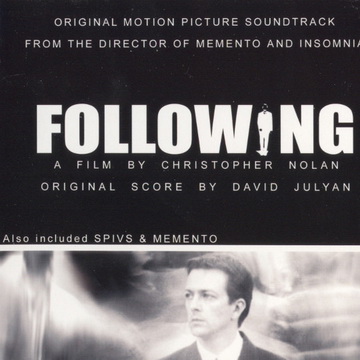 Your second collaboration, Following had a musical budget of around 8 dollars! How did you manage to write a score with such restrictions?
Your second collaboration, Following had a musical budget of around 8 dollars! How did you manage to write a score with such restrictions?On Following, as little as possible was paid for. Everyone worked for free. We used locations for free, edited for free in downtime in places. The only thing paid for was the film stock and processing. I jokingly added the comment that the only thing paid on the music score was the blank DAT tape on which to record it.
In a more serious answer, we didn't have any kind of budget, but the film was made deliberately to work in that way. It was a very small film about a loner guy who breaks into people's flats. We didn't need big locations or big scenes with extras or anything like that. Therefore, the music was quite small. I had a studio at home where I was able to work. If someone had said to me, "Here's a budget for an orchestra", it wouldn't have made sense. Everything else was small scale, black and white, hand held etc. If we suddenly had thrown more sounds on top of it, it would have sounded wrong.
The other thing is, though we didn't have money, we had time. That makes things much easier.
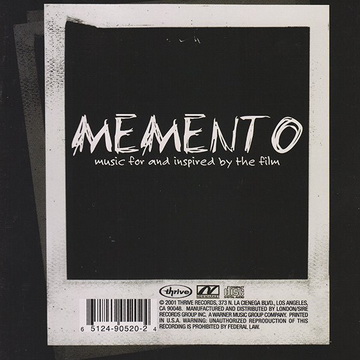 You first major success was the score for Memento. What reactions did you receive after the release? Do you care about criticism and feedback?
You first major success was the score for Memento. What reactions did you receive after the release? Do you care about criticism and feedback?The reaction to Memento was good. It's great to start reading reviews that said how good the music was. One highlight was Mojo Magazine putting Memento about #50 in an article on the Top 100 soundtracks.
I tend not to worry about the critics too much. I think it's more important to worry about writing the music than what people think about it.
Your melancholic score on Memento's soundtrack is often interrupted by powerful electronic compositions by other artists. Isn't it problematic, if there's such a difference between the score and the songs ("inspired by" music), especially if they are mixed on the disc?
It was a very interesting CD. In that situation, the score is much more in the hands of the record label. Some of the track worked and some of them didn't.
What do you think about film score CDs in general? Do you think they work on their own, or do they loose their impact when they are separated from the movies?
I always find it amusing. So many reviews I've read of soundtrack CDs at some point in the review will say, "The music doesn't work as well on the CD as in the movie". I'm always surprised. That's the point, really. It's a film score. With The Prestige, I think it does play very well. I do try to make sure the CD at least works for a fan of the film or a fan of the music; that it has enough variety and not too much repetition in it. On The Prestige, we cut down 86 minutes of score down to 48 minutes on the CD. That's not to shortchange people with music but to make sure the CD doesn't become repetitive or lose its impact as a listening experience.
Do you listen to film score CDs or pay attention to other composers' work? If yes, who is your favorite?
I don't listen to as much as I used to. The more scores I write, the less other people I listen to. You've been working all day on film music. You don't relax at the end of the day by listening to more film music.
Some of my choices are obvious people like Bernard Herrmann, John Barry and Ennio Morricone. I like a lot of Vangelis's music, particularly Blade Runner and the music that was used in the TV series Cosmos.
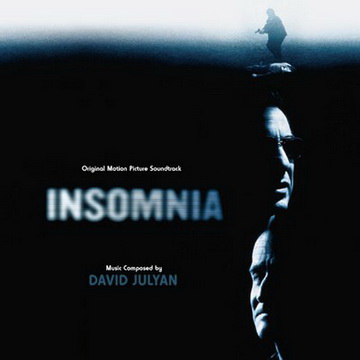 Let's jump to Insomnia (2002). Bigger stars (Robin Williams, Al Pacino), higher budget than Memento. Did you feel some kind of pressure because of these differences?
Let's jump to Insomnia (2002). Bigger stars (Robin Williams, Al Pacino), higher budget than Memento. Did you feel some kind of pressure because of these differences?I guess there were totally different pressures, but I tended not to think about them. When I'm doing a film I concentrate on three things: what I'm doing, what the director wants and the film itself.
I don't see any difference in scoring a big film opposed to scoring a tiny independent film.
Memento had one major theme for Leonard's state of mind, Insomnia has more – one for Walter, one for Elie and Dormer, and another one for Dormer and Kay. How do you decide which characters or relationships deserve their own theme in your scores?
I think it happens automatically. When you're watching a film, there's always one starting point. There's one scene that inspires you first of all. I don't specifically go by any one character's theme. I don't want to be tied to the motif of every time a character is seen, their theme must play. I tend to concentrate on the mood of the individual situation as much as on the individual characters.
The soundtrack to The Descent was published long after the film's release. Why did this production took so long and how did you manage to get it published eventually?
That's up to the film company and the record company.
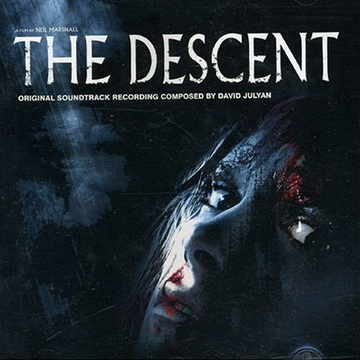 Our reviewers feel that the climatic chase from The Descent is one of your best compositions with the greatest impact. Which is your favorite score or cue from your body of work?
Our reviewers feel that the climatic chase from The Descent is one of your best compositions with the greatest impact. Which is your favorite score or cue from your body of work?The funny thing is that I often like the score I've finished most recently best just because it's freshest in my mind. Otherwise it's so hard to pick favourites, they all have their different feel, one might be my favourite today, another tomorrow.
I am very pleased with the music for The Prestige. The cue "The Light Field" has some great sounds in it and was one of the first I wrote for the film, and "A New Trick" is a favourite. I also go back to music from a British comedy called Inside I'm Dancing. That score was very different for me as it was all orchestral and no electronics at all. A lot of the stuff I do and am known for is more sort of textural and atmospheric, that was more melodically led.
Compared to the previous suspenseful and low-key scores, what was it like to write a bombastic orchestral score? Did you deliberately seek the opportunity to try your hands at scoring a more dynamic film?
I didn't deliberately seek it out. It was great fun to do a horror film and have that excuse to put the music over the top in places. On the whole I prefer subtle, quiet music. That's my listening taste. I like that I get the opportunity to compose as a different character for each film.
Knowing about your previous works, Dungeons and Dragons: Wrath of the Dragon God is a surprising title in your filmography. How did you get involved in this project? Could we consider it to be an experiment before going onto more adventure scores?
I was approached through my agent. It was an opportunity to do something different. It was the first time I'd done a film that was heavy on special effects. It was interesting to see how that worked. There was certainly no experiment about it.
For some time, your name was mentioned in connection with Batman Begins. Did this piece of news have any validity, or was this just a conclusion based on the director?
Yes, the Internet is full of rumors. I've read some very funny things about myself.
Was it a natural choice that you'd return for Christopher Nolan's next movie (The Prestige) after a brief absence?
We've worked together successfully in the past and I was happy to have the opportunity.
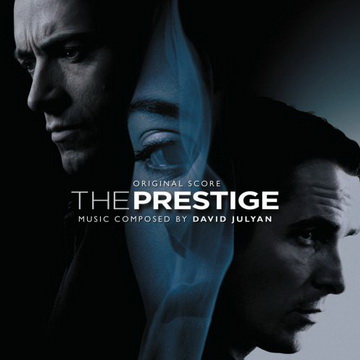 Perhaps The Prestige is your most ambitious movie so far. Could you tell us about the composition and recording of this score? Were there any different demands about the music this time around?
Perhaps The Prestige is your most ambitious movie so far. Could you tell us about the composition and recording of this score? Were there any different demands about the music this time around?Although he was making a period film, Chris didn't want a period film score. If you look at The Prestige, it's a period setting but it doesn't act like a period score. From the start, I knew we'd be combining full orchestra with electronics and doing the kind of score I like best which is combining electronic textures with orchestral textures.
We didn't use a temp score, so I actually started work on the project quite early on. We started with a script and a couple of conversations about the kind of music Chris wanted. He wanted the sound of anticipation that magic was going to happen. I actually started writing before I'd seen the picture. This meant we did a lot of experimenting and exploring of ideas. It took a lot of refining and some ideas got thrown out. It also meant that, when we started editing, we had a library of my music that we could start using on the film as a temp score. Instead of replacing temp score by other composers, I was having to refine and improve upon the temp we had already started. It's a great way of working.
Apart from the director, Hans Zimmer is one of the producers of the soundtrack. What role did he play about the making and release of this score?
This was my first time recording in Los Angeles. My previous scores had all been recorded in London. I ended up taking a writing room in his company and he was able to make a few suggestions as to Los Angeles people who might be good to use.
The Prestige seems to be a major hit to be seen by many. When you sign a contract, are you interested in how a more successful movie might affect your career?
I try not to worry about the end result of the movie. It would be very unwise to try to second guess the tastes of the film-going public.
When we made Following, no one assumed it would get a theatrical release and launch our careers. That was the biggest fluck because there was no expectation. Since then, I don't worry so much about what the film is going to do. I work on making the score as good as possible.
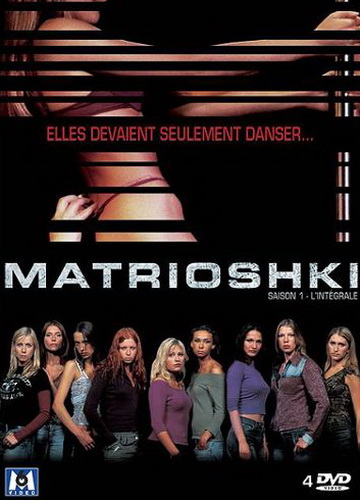 The Belgian series entitled Matroesjka seems to be another strange entry in your discography. How were you asked for this project?
The Belgian series entitled Matroesjka seems to be another strange entry in your discography. How were you asked for this project?I met one of the producers when I was over at the Ghent Film Festival in Belgium. It was an interesting experiment writing for TV, especially scoring for a program in a language I didn't speak.
How much music was written for the episodes?
I don't remember. They had a lot of songs in them as well.
Now that you've written for movies and television, do you considering giving a shot in other mediums as well? Would you ever do an advertisement or a video game?
All mediums are interesting as the present different challenges. Video games are an interesting market at the moment, where a lot of games have budgets in excess of Hollywood movies. Something like theater work would be an interesting challenge. As a composer, I'm always seeking out projects that push me to try something new.
Since your approach to film music is more modern than lots of other composers, we'd like to ask whether you have any other interesting musical projects outside film scoring?
I must confess I have a few pet projects I'll get round to during a gap between film scores one day.
In which movie's credits can we see your name next?
The next thing for me is a British film called Outlaw from director Nick Love.
To know more about David's work, please visit the composer's official website.
Special thanks to Tom Kidd
November 10th, 2006
November 10th, 2006








